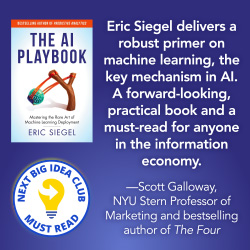Eric Siegel had already been working in the machine learning world for more than 30 years by the time the rest of the world caught up with him. Siegel’s been a machine learning (ML) consultant to Fortune 500 companies, an author, and a former former Columbia University professor, and to him the last year or so of AI hype has gotten way out of hand.
Though the world has come to accept AI as our grand technological future, it’s often hard to distinguish from classic ML, which has, in fact, been around for decades. ML predicts which ads we see online, it keeps inboxes free of spam, and it powers facial recognition. (Siegel’s popular Machine Learning Week conference has been running since 2009.) AI, on the other hand, has lately come to refer to generative AI systems like ChatGPT, some of which are capable of performing humanlike tasks.
But Siegel thinks the term “artificial intelligence” oversells what today’s systems can do. More importantly, in his new book The AI Playbook: Mastering the Rare Art of Machine Learning Deployment, which is due out in February, Siegel makes a more radical argument: that the hype around AI distracts from its now proven ability to carry out powerful, but unsexy tasks. For example, UPS was able to cut 185 million delivery miles and save $350 million annually, in large part by building an ML system to predict package destinations for hundreds of millions of addresses. Not exactly society-shattering, but certainly impactful.
The AI Playbook is an antidote to overheated rhetoric of all-powerful AI. Whether you call it AI or ML—and yes, the terms get awfully blurry—the book helpfully lays out the key steps to deploying the technology we’re now all obsessed with. Fast Company spoke to Siegel about why so many AI projects fail to get off the ground and how to get execs and engineers on the same page. The conversation has been edited for length and clarity.
As someone who’s worked in the machine learning industry for decades, how has it been for you personally the last year watching the hype around AI since ChatGPT launched?
It’s kind of over the top, right? There’s a part of me that totally understands why the AI brand and concept has been so well adopted—and, indeed, as a child, that’s what got me into all this in the first place. There is a side of me that I try to reserve for private conversations with friends that’s frustrated with the hype and has been for a very long time. That hype just got about 10 or 20 times worse a year ago.
Why do you think the term “artificial intelligence” is so misleading now?
Everyone talks about that conference at Dartmouth in the 1950s, where they set out to sort of decide how they’re going to create AI.[Editor’s note: In 1956, leading scientists and philosophers met at the “Dartmouth Summer Research Project on Artificial Intelligence.” The conference is credited with launching AI as a discipline.] This meeting is almost always reported on and reiterated with reverence.
But, no—I mean, the problem is what they did with the branding and the concept of AI, a problem that still persists to this day. It’s mythology that you can anthropomorphize a machine in a plausible way. Now, I don’t mean that theoretically, that a machine could never be as all-capable as a human. But it’s the idea that you can program a machine to do all the things the human brain or human mind does, which is a much, much, much more unwieldy proposition than people generally take into account.
And they mistake [AI’s] progress and improvements on certain tasks—as impressive as they truly are—with progress towards human-level capability. So the attempt is to abstract the word intelligence away from humanity.
Your book focuses on how companies can use this technology in the real world. Whether you call it ML or AI, how can companies get this tech right?
By focusing on truly valuable operational improvements by way of machine learning. We see that focus on concrete value and realistic uses of today’s technology. In part, the book is an antidote to the AI hype or a solution to it.
So what the book does is to break it down into a six-step process that I call BizML, the end-to-end practice for running a machine learning project. So that not only is the number-crunching sound, but in the end, it actually deploys and generates a true return to the organization.
To continue reading this article, click here.







Pingback: Essential Innovations In Transportation & Logistics For Improved Efficiency - ZOBUZ